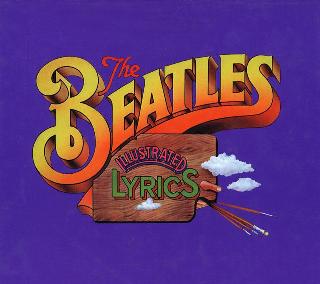Index
Home
Vorige
Can You Take Me Back
Composer(s) : Lennon and McCartney
Year : 1968
Chords/Tabs: Can You Take Me Back
Notes on "Can You Take Me Back" (CYTMB)
KEY F Major/minor
METER 4/4
FORM Verse -> Verse (fadeout)
GENERAL POINTS OF INTEREST
Style and Form
- "Can You Take Me Back" stands on the borderline for me in terms of
whether it should be included in the official canon of Beatles songs.
It's performed over a static single chord, presented to us in fragmentary
form, and isn't even included on the printed track list of the album on
which it appears. On the other hand you can't really argue that it is any
less substantive or discretely distinctive than the other White Album
fragments or bonsais that *do* appear on the track list.
- Regardless, the song bears interest primarily for its melodic quality,
free-verse phrasing, and its uncanny contextual affect.
- Secondarily we learn from the 9/16/68
"I Will" session at which CYTMB was
recorded that horsing around in the studio with half-remembered older
songs, or vamping around with songs being made up on the spur of the
moment was a Beatles phenomenon hardly limited to the Get Back Sessions
as one might otherwise suppose. Anthology 3 has eventually familiarized
us with the fragmentary "Step Inside Love" and the improvisatory "Los
Paranoias" from the same session.
- The officially released portion of CYTMB was skillfully excerpted from
a longer performance to isolate the best 28 seconds of the entire
performance, and create the illusion that the remainder is as special;
kind of like an artfully cropped photograph. What we experience as
a haunting fadeout verse in mid-course of what we assume is a second
verse turns out to be part of a dinky, complete ending coda if you
bother to check out the readily available bootlegs of longer excerpts
of the session. Indeed, those outtakes reveal that Paul did not have
any more musical or even worthwhile lyrical material in hand for this
number on that day beyond what we already know. If anything, the
shorter excerpt is an improvement over the raw track; shades of
"Dig It."
Melody and Harmony
- The tune is based on a strictly pentatonic blues lick covering the
relatively broad range of a 10th; i.e. F-Ab-Bb-C-Eb running from
the F below middle C to the Ab above it.
- The harmony is a pedal point of a dominant seventh on the I chord,
with the A-flats of the tune providing the texture of a pervasive
cross-relation.
Arrangement
- We have just Paul on acoustic guitar, with Ringo and John providing light
percussion effects.
SECTION-BY-SECTION WALKTHROUGH
Verse
- The verse is 12 measures long. On some internal level Paul must have
been keeping track of this as "3 times 4" but his scanning of the lyrics
in terms of both actual phrase lengths and the placement of syncopated
accents is artfully insistent:
Can ... where can ... back?
|1 2 3 4 |1 2 3 4 |1 2 3 4 |1 2 3 4 |
Can ... where brother take me back ----------------
|1 2 3 4 |1 2 3 4 |1 2 3 4 & |1 2 3 4 |
------------------- can.. take me back -------------------------
|1 2 3 4 |1 2 ..3 4 & |1 2 3 4 |1 2 3 4 |
- The first sung phrase begins on the downbeat of the 1st measure and ends
with a hard accent just before downbeat of measure 4, leaving the guitar
vamp to fill out the rest of it.
- The second sung phrase also begins on the downbeat of the 1st measure,
but pitches its sustained, mid-point high note in exactly the same rhythmic
location as the end of the first phrase. This high note is tied all the
way into beginning of the 3rd musical phrase place and ties it over into
the beginning of the 2nd measure of the 3rd musical phrase.
- A brief third sung phrase is squeezed in starting right on the tail of
the second sung. The third sung phrase places its ending accent just before
the downbeat of the 3rd measure of the 3rd phrase though its melissma
sustains to the end of the 12th measure.
SOME FINAL THOUGHTS
- The album context of CYTMB is ambiguous, the song not being singled
out per se on the track listing. Are we to consider it as a trailer
to
"Cry Baby Cry"
or a curtain raiser to "Revolution 9?" For my money,
the decision comes down unequivocally on the side of the latter regardless
of where the CD puts it.
- In context of what's about to follow, the protagonist of our little
fragment comes off like someone being carried off to some new experience,
location, or even a "reality" with strongly mixed feelings; say equal
parts awe-struck anticipation, and the primal fear of possibly never
being able on his own to get back where he came from. It's kind of
a warm-up for, or a darker underside of
"Golden Slumbers."
Regards,
Alan (awp@world.std.com)
---
"I don't want to find you've lost him." 020901#198
---
Copyright (c) 2001 by Alan W. Pollack
All Rights Reserved
This article may be reproduced, retransmitted, redistributed and
otherwise propagated at will, provided that this notice remains
intact and in place.
Ook op The Beatles [White Album]:
(c) 2024 Serge Girard


 (c) Alan Aldrigde, The Beatles Illustrated Lyrics
(c) Alan Aldrigde, The Beatles Illustrated Lyrics